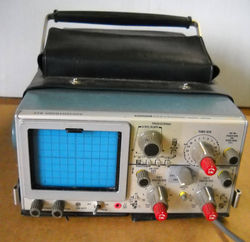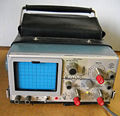326: Difference between revisions
Jump to navigation
Jump to search
No edit summary |
No edit summary |
||
| Line 53: | Line 53: | ||
Image:326_2.jpg|open, upper | Image:326_2.jpg|open, upper | ||
Image:326_accu.jpg|new battery pack (homemade from 9 pieces NiCd sub-C cell) | Image:326_accu.jpg|new battery pack (homemade from 9 pieces NiCd sub-C cell) | ||
Tek 326 trace1.jpg | |||
Tek 326 trace2.jpg | |||
Tek 326 left.jpg | |||
Tek 326 right power connection.jpg | |||
</gallery> | </gallery> | ||
[[Category:300 series scopes]] | [[Category:300 series scopes]] | ||
Revision as of 19:22, 22 January 2017
The Sony/Tektronix 326 is an ultra-portable 10 MHz dual trace oscilloscope with 300 ns delay line and a removable battery pack.
Electrically, it is relatively classic, but it is not constructed like classic Tek scopes.
The 326 has no Tek-made ICs. It uses many Sony transistors.
The 326's power supply/charger is conceptually similar to that of the 323, but the 0.3 Ω resistor is in the battery pack.
The power supply and oscilloscope are separable. The scope can be be operated without power supply.
Key Specifications
| Bandwidth | 10 MHz (approx. 5 MHz in ×10 mode) |
|---|---|
| Rise time | 36 ns (72 ns in ×10 mode) |
| Sweep | 1 μs/Div to 1 s/Div, 1—2—5, ×10 magnifier (i.e. to 100 ns/Div) |
| Deflection | 10 mV/Div to 10 V/Div (1 mV/Div to 1 V/Div in ×10 mode) |
| Input impedance | 1 MΩ // 47 pF |
| Calibrator | 0.5 Vp-p, 800 Hz +- 250 Hz, source impedance 10 kΩ |
| CRT | 10 × 8 Div. @ 6.25 mm (0.25"), 154-0667-xx |
| AC Power | 90—136 V or 180—272 V, 48—440 Hz, 35 VA at 136 V (maximum intensity, maximum charge rate) |
| DC Power | 9—32 V, 12 W max. |
| Battery | Nine size "C" NiCd cells, runtime 1.5 h (full intensity) / 4 h (low intensity), charge time 16 h |
| Dimensions | 10.2 cm × 22.2 cm × 38.1 cm (31 cm without charger) |
| Weight | 5.9 kg (4.5 kg without charger) |
| Features |
|
Pictures
-
front
-
rear
-
open, lower
-
open, upper
-
new battery pack (homemade from 9 pieces NiCd sub-C cell)
-
-
-
-









